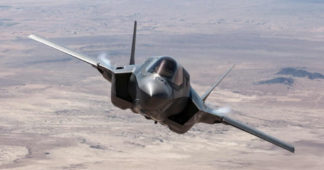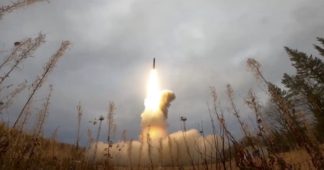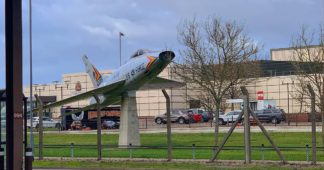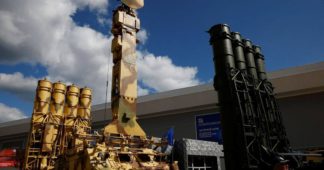The U.S. is reportedly planning to deploy nukes “three times the strength of the Hiroshima bomb” to an air base in Suffolk.
By Jake Johnson
Feb 02, 2024
Nuclear weapon abolitionists sounded alarm Friday in response to fresh evidence that the United States is planning to station nukes in the United Kingdom for the first time in more than 15 years, a move that opponents said would only heighten the risk of an atomic war.
The U.S. removed more than 100 nuclear bombs from Royal Air Force Lakenheath, a base in Suffolk, in 2008 following sustained protests from the U.K.-based Campaign for Nuclear Disarmament (CND) and other nonproliferation advocates.
CND warned in a statement Friday that the redeployment of nukes to Lakenheath would “make Britain a guaranteed target in the event of any war between NATO and Russia.”
“We encourage both the media and the public to increase pressure on the British government to be honest about this deployment,” said Kate Hudson, CND’s general secretary.
“It’s shameful that our government continues to take us for fools on this serious matter.”
The Telegraphreported last week that “procurement contracts for a new facility at RAF Lakenheath in Suffolk confirm that the U.S. intends to place nuclear warheads three times the strength of the Hiroshima bomb at the air base.”
“The return of American weapons to the U.K. is part of a NATO-wide program to develop and upgrade nuclear sites in response to heightened tensions with the Kremlin in the wake of the February 2022 invasion of Ukraine,” the U.K. newspaper continued. “Russia has stated that the placement of U.S. weapons in Britain would be viewed by Moscow as an ‘escalation’ and would be met with ‘compensating counter-measures.'”
CND said Friday it has “strongly suspected” that the Lakenheath base was being prepped for the return of U.S. nukes for nearly two years. Last August, Matt Korda and Hans Kristensen of the Nuclear Information Project highlighted U.S. Air Force budget documents for fiscal year 2024 that “strongly imply” the Biden administration is moving toward reestablishing American nuclear presence in the U.K.
As the pair explained:
“The Air Force’s FY 2024 budgetary justification package, dated March 2023, notes the planned construction of a “surety dormitory” at RAF Lakenheath, approximately 100 kilometers northeast of London. The “surety dormitory” was also briefly mentioned in the Department of Defense’s testimony to Congress in March 2023, but with no accompanying explanation. “Surety” is a term commonly used within the Department of Defense and Department of Energy to refer to the capability to keep nuclear weapons safe, secure, and under positive control…
Construction of the facility is scheduled to begin in June 2024 and end in February 2026. ”
CND said it has questioned the U.K.’s Defense Ministry and local officials about the “lawfulness of the planning rights used to allow the building of the surety dormitory.”
“The Lakenheath upgrades form part of a wider effort to upgrade U.S./NATO nuclear infrastructure across Europe, which has preceded—and likely provoked—Russia’s deployment of its own nuclear weapons to Belarus,” the group said. “Despite this, neither the U.S. nor U.K. government have given information to the public about this deployment.”
Hudson argued that “far from making us safer, this deployment has escalated the dangers, brought Russian nukes to Europe, and made us a nuclear target.”
“It’s shameful that our government continues to take us for fools on this serious matter,” said Hudson. “They are refusing to give us crucial information about our security.”
We remind our readers that publication of articles on our site does not mean that we agree with what is written. Our policy is to publish anything which we consider of interest, so as to assist our readers in forming their opinions. Sometimes we even publish articles with which we totally disagree, since we believe it is important for our readers to be informed on as wide a spectrum of views as possible.











